Abstract
Continuing professional training is a goal pursued at the level of each country and ensuring solid skills is a permanent concern of today's society, in order for the individual to well adapt to the social, economic, cultural changes we face. Thus, teacher training becomes a challenge for universities that train future specialized teachers in a specific field, and the interest is focused on both initial and continuous training, on the improvement of teaching-learning and assessment strategies in the process of education. This research presents the results of a study carried out with teachers from the pre-university music environment from several counties of Romania and highlights the need for improvement in the field of all musical specializations. Didactic competence is necessary for any teacher, regardless of the subject, and it is formed throughout the professional life, by attending training courses, in order to upgrade teacher skills in the field of education sciences.
Keywords: Continuous trainig, education, music specializations, teaching competence
Introduction
Lifelong learning is a fundamental goal of the European Commission, formulated in the education programs proposed in recent decades. Now, perhaps more than back then, due to the faster changes facing society in all areas of interest, continuous development after graduation is an essential component, which ensures better adaptation and integration of the individual into the labor market, an extremely dynamic sector lately.
The field of education is focusing on the permanent adaptation of paradigms, contents and strategies for approaching the education of children and young people. Among the factors that influence school activities are the new technologies, the latest research made by specialists in Education Sciences, and based on the results, the regulations from the Ministry of Education, in order to improve the quality of education.
Following the negative impact of the pandemic on education around the world, the European Commission is proposing a guide to ensure a unified and effective approach to the education process by 2025, targeting a number of important components, such as quality, inclusion and gender equality, green and digital transitions, teacher training, the development of higher education and the geopolitical dimension (European Commission, 2020), which assume concern for lifelong learning.
Music and its influence in the development of a complex personality
We say that music begins where words end. Music is a vital element in human life, the one that accompanies humanity from its beginnings, being present in a ritual that involves melodic or rhythmic elements. Music is an essential component of our life, regardless of age and everyday concerns. Going further, general music training, from an early age, ensures a better understanding of this field and a constant practice of music brings many benefits, both emotional and cognitive.
As a solid component of aesthetic education, music education is carried out through various activities organized in school or extracurricular activities, in which preschoolers and schoolers of all ages participate. Through music, many musical concepts can be learned, but also general ones, which will be capitalized later. As the child practices music, by moving to its rhythm or auditions, playing instruments or singing songs, he develops a variety of musical skills but also creative skills, the ability to concentrate, motor coordination, social skills, memorization skills, all made in an extremely pleasant and useful way for other school disciplines, in term of transversal competences (Sârb, 2017, pp. 75-76).
For example, some experts claim that music can contribute to the development of knowledge in the field of science and to a good understanding of the concepts of this field, by watching scientific music videos, in this way the children’s learning performance are better, demonstrated by direct answers to questions (Crowther et al., 2016, pp. 73-95). Others point out that the text and songs in English facilitate its acquisition as a second language spoken after the mother tongue, based on a deep focus on pronunciation fidelity, vocabulary enrichment and grammar improvement (Romaniuk, 2019, pp. 225-229).
The teacher is the one who can transmit the information in a certain way that is both pleasant and efficient, adapted to the student's age. Specialists say that sometimes, music theory can be quite abstract for students, especially the young ones, “for most children, music theory is a conglomerate of hard to understand and assimilate information” (Muntean, 2019, p. 1824), and the role of the teacher is to adopt interactive strategies appropriate to the age profile and to adapt the contents, in order to optimize learning.
Music vocational education in Romania
Each field of activity has its own characteristics and in education, teachers benefit from a special training, adapted to the specifics of the chosen profile, whether we are talking about the initial training of future teachers, or their training and continuous development.
A special place in the system of school subjects is taken by music vocational education. The developing personality of the student is influenced by all subjects during schoolarity, each contributing to the development of the main levels: cognitive, affective and behavioral. Thus, general or specialized music education acquires a special place, a perspective that brings huge pedagogical responsibilities, and awareness of this aspect should be a concern of all specialists who manage educational institutions.
The current national curriculum involves training in the field of arts (music and fine arts) as part of the compulsory general education of the student, and in some profiles, it extends to high school. In this way, Romanian education meets the objectives of the European Commission on the training of lifelong learning skills. The last competence refers to the very essence of arts education as a "cultural awareness and expression" (European Commission, 2006); through music the individual is able to appreciate artistic and creative values and to express himself sincerely on an emotional level. Thus, the school, by carrying out a qualitative artistic education, aims to prepare the individual to receive the beauty around him, to be able to distinguish between value and non-value or kitsch, to form in order to create new values.
The structure of the general education system in Romania provides at least three directions for the development of vocational education, such as music, fine arts and sports. These subjects involve a teaching staff with specialized training, and in the artistic field, schools and teachers face difficulties in ensuring special education programs. This category of teachers, compared to the number of general education teachers, is much smaller, which is reflected in the program offers provided by institutions or universities that organise courses for continuing training.
Although the development of music education over time in the student's school career is long-lasting, in the offers of the institutions mentioned above, there are no continuing training programs for teachers in the field of music. As a particularity of music training in Romanian schools, we have to say that music is studied in general schools but also in special music schools. Thus, in the first category of institutions, in primary schools children are involved in two musical activities per week organised by the primary school teacher and only in secondary school students study music with a music teacher, with only one class per week. There is also vocational music education, the latter category mentioned, which requires constant and rigorous training in music, only with music teachers, and students attend many classes of music theory, instruments, chamber music, music history, etc.
Regardless of the profile of the school, both specialised musical training and the didactic training of the teacher (with all the existing musical specializations) in the field of music are very important, in order to face all the challenges of modern teaching-learning and assessment strategies.
The specifics of continuing training courses
There is a deep lack of continuing education courses for music specialties and the purpose of this study is precisely to highlight a need to improve the teacher’s activities in pre-university music education. That is why our higher education institution wants to offer a continuing education program, which is intended to be an opportunity for improvement in all specialties of the musical field, either as general music education, or as specialized musical training, in music schools (opera singing, instruments, music theory).
Teachers in Romania have to obtain, in a cycle of five years of classroom teaching activity, a number of credits through continuous training, in order to perform better in their activity. The novelty of the last years is the transition from objectives to competencies and the proper information on these differences has to be done in the formal context, like courses provided by specialized institutions, with specialists in the field of psycho-pedagogy and didactics. Thus, teachers can attend different programs, most covering general topics of interest, such as new technologies, general teaching skills, strategies for approaching education, modern paradigms in pedagogy, new education, and enhancing the training of students' skills.
We consider it opportune to specify the double meaning that the competence acquires here, namely the formation of students’ competencies (that the teacher pursues according to the new orientations in education) and secondly, the development of didactic competence, compulsory component for any teacher.
Specialists in education define competence as "an individual or collective characteristic of selecting, mobilizing, combining, and effectively using, in a certain context, an integrated set of knowledge, skills, and attitudes" (Bocoș et al., 2020, p. 16). The synergy of the three components is the key to success and, at the same time, the trend of the latest regulations in education, to streamline the educational process. In this line of thought, all the teachers will be focused in order to develop both the teacher's didactic competence and the students' musical competence.
From the teacher's perspective, in the field of music, didactic competence means that, starting from a good theoretical background represented by the elements of musical language, taught during activities (knowledge), the teacher must ensure that students have understood the theoretical concepts, he needs to create different educational contexts, which promote learning through discovery, using new technologies, to make teaching more interactive (skills) and promote research, flexibility, individual study, improvement, openness to new (attitudes).
In order to reach the professional standards of the teaching career, for different school levels, the teacher, after the initial preparation for the didactic profession in a certain specialty, has to participate to continuous training courses, both general (psycho-pedagogical training) and specialized (didactics in a specialty), that ensures superior performance of students, from one school year to another.
Purpose of the Study
Through this research we aimed to highlight the importance of a good didactical and specialized training of teachers in the field of music, to be achieved for all music specializations (music education, opera singing, instruments), but also the need to design such a training course, through the institution of higher music education. The need for a training program for teachers in music vocational schools but also for those in music education in theoretical schools has been signalled to us recently, which is why we started this research that will embody the very grounds on which we will organize special courses.
Research Methods
Type of research
In order to determine more rigorously the need for continuous training of teachers in the field of music, we handed a questionnaire to teachers in pre-university education, in collaboration with specialized institutions from several counties in Romania, where there are vocational education schools.
The questionnaire was based on a set of questions in order to find out information about the music specialty taught, teaching experience, demographics, the number of training courses completed so far and the willingness to participate in training in the field of music specialization. The questionnaire was distributed online in the period unfolding between March-April 2021.
Participants
The participants in this study are 334 teachers of different specialties in the field of music, from rural and urban areas, from 15 counties of Romania. In the spring of last year, they answered the proposed questionnaire, and for a fair and honest assessment, the participants registered anonymously, and the results were centralized and presented below.
Findings
Regarding the musical specializations of the participating teachers, most of the respondents teach Music Education, followed by those who teach Piano, then String instruments and Wind instruments, Opera singing, Music theory (see Figure 1).
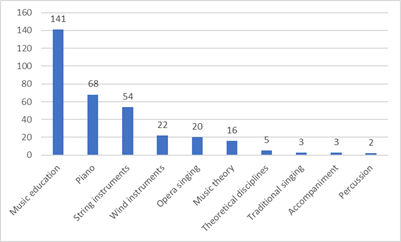
The following table (see Tabel 1) shows the data for the counties which the surveyed teachers come from. Thus, it can be seen that most of them come from counties near the university center where the training courses will take place (except Timiș) or where they graduated. Top places are the counties of Bihor, Timiș, Mureș, Alba, Cluj and at the end of this list, as expected, distant counties, as Dolj or Arad.
A relevant dimension for research is seniority in education. With this study we realized that teachers have a teaching experience of up to 33 years. Of these, the first place is occupied by those who have an average seniority, between 14-20 years, and on the second position are fresh teachers or in the first years of the teaching career, with an experience between 1-6 years (see Figure 2).
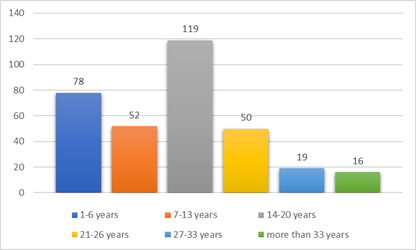
Seniority in teaching also influenced the number of training courses attended by teachers, as we can see in the next question. Thus, figure 3 presents the number of courses attended by teachers in the last 5 years. Although the offer in the music specialty is low, we found that teachers were interested in acquiring new skills through general continuing training programs, details demonstrated in Figure 3.
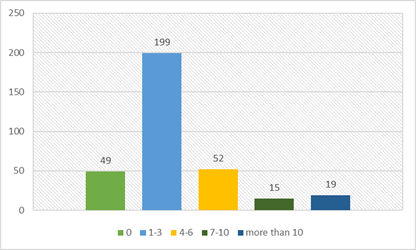
It can be seen (in Figure 3) that most of the teachers who answered the questionnaire, 60% of them, attended between 1-3 courses in the last 5 years, and the next position, with 4 to 6 courses, is a long way off (16%). A considerable number of respondents (15%) did not attend training courses (hopefully they are either close to retiring or junior teachers, who are not yet familiar with the specifics of these courses).
The questionnaire also enquired about music courses, but the relevance of the answers is relative. From the data provided by the respondents we deduced that they included here, as training courses, master classes, short courses (2-3 days), summer schools, etc., not necessarily music specialty teaching courses, with a considerable number of hours and credits (see Figure 4).
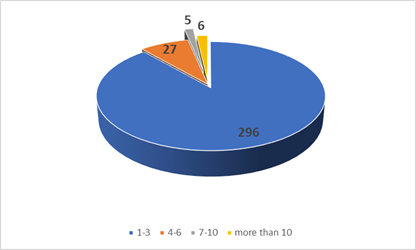
Regarding the usefulness of the training courses completed, respondents were in favor of their effectiveness, many teachers (45%) considering the courses attended to have been useful. However, a fairly large number believe that these courses have been useful or quite useful (14%) for their didactic development (see Figure 5).
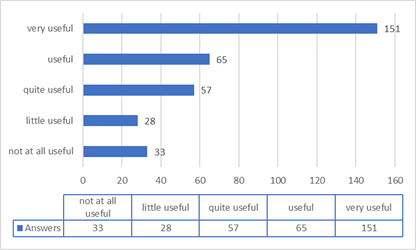
The last question of the questionnaire is the most important and relevant for the present study, it refers to the need for training courses in the specialization taught. The results are clear enough, an extremely large number of teachers (78%) expressing the need for specialized music courses but also the availability for a continuous training course in the musical specialization they carry out their activity (see Figure 6).
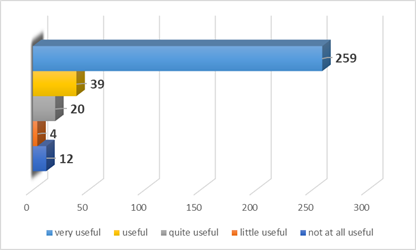
Conclusions
The evolution in the teaching career is influenced by the teacher's attitude towards his own activity, by the dedication and the desire to improve the teaching-learning and assessing strategies. Each stage promoted by the didactic levels (degrees) will be a landmark for the future training and didactic competence, expression of the synthesis between knowledge, abilities and attitudes, it is in a permanent process of formation and construction, directly proportional to the quality and quantity of continuous training courses the teacher attends.
The present study demonstrates, on the one hand, the need to update skills, concepts, strategic approaches, visions, rallies and the European norms in education, actions that can be materialized in the completion of continuing education courses with a general theme. On the other hand, there is a lack of training courses in the field of music specialty, teachers showing a great willingness to attend courses in their own music specialization, out of the desire to improve themselves in an organizational context, both in terms of specialized music knowledge and music didactics field.
Acknowledgments
We would like to thank all the teachers from the music specializations who took part in our study, the county institutions who helped us disseminate the questionnaire, for their willingness to answer sincerely to questions formulated to provide a clear picture of the current situation of music education in Romania. In the near future we wish to start this training course in the field of music didactics, and together, we will contribute to the formation of tomorrow's audience in concert halls and future musicians, either conductors, composers, musicologists or performers.
References
Bocoș, M., Șerbănescu, L., & Ioja, I. (2020). Managementul de formare continua a cadrelor didactice [The management of continuous training of teaching staff]. Editura Polirom.
Commission to the European Parliament, the Council, the European Economic and Social Committee and the Committee of the Regions. Retrieved on May 22, 2022, from https://eur-lex.europa.eu/legal-content/EN/TXT/?uri=CELEX%3A52020DC0625
Crowther, G. J., McFadden, T., Fleming, J. S., & Davis, K. (2016). Leveraging the power of music to improve science education. International Journal of Science Education, 38(1), 73-95. DOI:
European Commission. (2006). Recommendation of the European Parliament and of the Council on Key Competences for Lifelong Learning, in Journal of the European Union. Retrieved on May 21, 2022, from https://eur-lex.europa.eu/legal-content/RO/TXT/?uri=celex%3A32006H0962
European Commission. (2020). European Education Area by 2025, in Communication from the
Muntean, L. (2019). Learning Musical Theory In Initial Teacher Education For The Preschool Level. In E. Soare, & C. Langa (Eds.), Education Facing Contemporary World Issues. European Proceedings of Social and Behavioural Sciences (Vol. 67, pp. 1823-1829). Future Academy. DOI:
Romaniuk, S. (2019). Learning English through Songs as one of Innovative Methods of Education. In journal Innovation in upbringing (Inovație în educație). Retrieved on May 22, 2022, from DOI:
Sârb, D. E. (2017). Muzica-dimensiune determinantă în procesul de învățare [Music-determining dimension in the learning process]. Editura MediaMusica.
Copyright information

This work is licensed under a Creative Commons Attribution-NonCommercial-NoDerivatives 4.0 International License.
About this article
Publication Date
31 May 2023
Article Doi
eBook ISBN
978-1-80296-962-7
Publisher
European Publisher
Volume
6
Print ISBN (optional)
-
Edition Number
1st Edition
Pages
1-710
Subjects
Education, reflection, development
Cite this article as:
Sârb, D. E. (2023). The Importance of Continuous Training for Pre-University Music Teachers. In I. Albulescu, & C. Stan (Eds.), Education, Reflection, Development - ERD 2022, vol 6. European Proceedings of Educational Sciences (pp. 686-694). European Publisher. https://doi.org/10.15405/epes.23056.63

